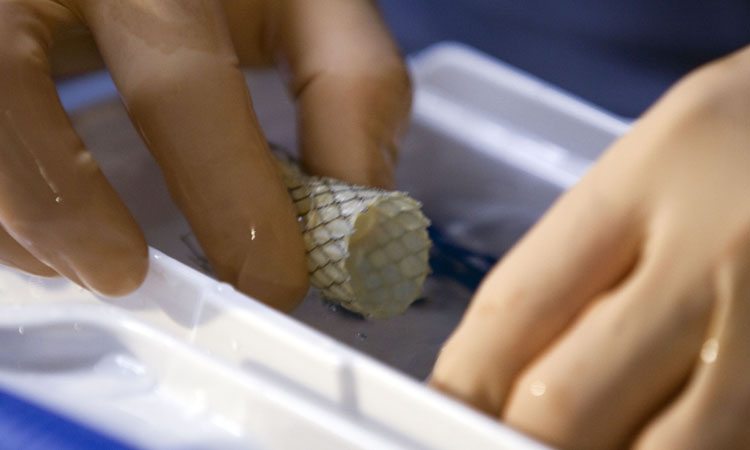Abrazo Arizona Heart Hospital is now performing Transcatheter Aortic Valve Replacement (TAVR), a minimally invasive alternative to open-heart surgery, on a larger group of patients, thanks to approval from the FDA.
The CoreValve Evolut transcatheter aortic valve replacement platform won approval earlier this year from the FDA for patients with symptomatic severe aortic stenosis who are at an intermediate risk for open-heart surgery.
Severe aortic stenosis is a narrowing of the aortic valve that obstructs blood flow to the heart and the rest of the body. For select patients who are good candidates for TAVR, a physician can implant a replacement valve through a small incision near the femoral artery in the groin. This is significantly less invasive than the traditional aortic valve surgery. A patient’s experience with a TAVR procedure may be comparable to a balloon treatment or an angiogram in terms of down time and recovery, and could require a shorter hospital stay compared with traditional open-heart surgery, according to the American Heart Association.
Initially, the TAVR procedure was available only to high-risk patients who could not withstand open heart surgery. The recent regulatory decision is based on data from SURTAVI. The trial, which used self-expanding bioprostheses, showed that the two-year rate of all-cause death or disabling stroke was 12.6 percent in patients who underwent TAVR with either the first-generation CoreValve prosthesis or next-generation Evolut R and 14.0 percent with surgery, a difference that met criteria for noninferiority.
Patients at intermediate risk for open heart surgery account for a large portion of the severe aortic stenosis population. Patients at intermediate risk for open-heart surgery have a mortality risk of greater than or equal to three percent at 30 days following the TAVR procedure, according to national data.
Last summer, Abrazo Arizona Heart Hospital became one of 80 sites nationwide to perform the TAVR procedure on low-risk patients as part of a two-year advanced clinical trial. The procedure is performed by a team of physicians and other caregivers at the hospital’s Institute for Valvular Diseases who specialize in treating structural heart conditions that interrupt the natural flow of blood through the body.
“This is great news for the estimated 1.5 million Americans who suffer from aortic stenosis,” said Dr. Timothy Byrne, market medical director of interventional cardiology for Abrazo Community Health Network. “We look forward to the results of this clinical trial for the low-risk population.’’
Abrazo Arizona Heart Hospital is at the forefront of new testing, treatments and technologies that will help extend quality of life for patients. Along with the TAVR study, Abrazo Arizona Heart Hospital is participating in more than two dozen national clinical studies in various areas of cardiovascular care – from aortic aneurysms to an irregular heartbeat and heart failure. The hospital’s stepped-up involvement in research is part of a bigger plan to continue its legacy of excellence in cardiovascular care in Arizona, across the Southwest and throughout the nation
The hospital also is establishing six institutes dedicated to areas of cardiac and vascular care.
For more information, visit AbrazoHealth.com.




